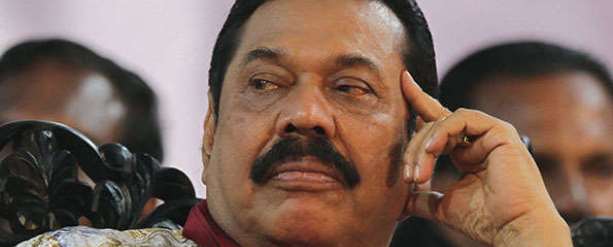The next few steps look anything but orderly
TAKE nothing for granted in Sri Lankan politics. Early on January 9th, to the surprise of almost everybody, Mahinda Rajapaksa conceded defeat in the presidential election conducted the day before. He promised an orderly transition of power and won praise for his unexpected graciousness.
In the days since, however, rumours have swirled in the capital suggesting that Mr Rajapaksa (pictured above, flanked by his men) in fact did so only grudgingly, after he had failed to persuade senior government officials and the army to support a coup instead. A spokesman for the new president, Maithripala Sirisena, who was sworn into office hurriedly on January 10th, said as much on January 11th. Privately other voices in the capital now corroborate the claim. The suggestion is that as Mr Rajapaksa realised that he was losing, early morning at his home in Colombo, he sought the support of the attorney-general, the chief justice as well as the chiefs of police and the army to scrap the announcement of the election results. Only after he failed to win their backing did he concede.
Elections and voting
Does that matter now? Yes, as an indication that Mr Rajapaksa does not consider this political contest to be over. Mr Sirisena may have been sworn into office, but his camp hardly looks orderly. Over the next weeks he must prove he can co-ordinate a wide coalition of disparate groups. A few minutes after taking charge on January 11th, he also oversaw the swearing in of a new prime minister for Sri Lanka, Ranil Wickremesinghe, who leads the United National Party, and is now supposed to form a government.
Mr Wickremesinghe has been prime minister twice before. According to the 100-day programme set forth during the new president’s election campaign the new government is supposed to have only a small cabinet, not one crammed with cronies and coalition allies. That already looks unlikely. Far harder yet, the constitution is to be redrawn by April 23rd to shift much power away from the over-strong presidential office, in favour of the prime minister. After that, a parliamentary election is supposed to be called.
So far it is unclear whether Mr Wickremesinghe, installed in haste amid fears of a coup, actually has sufficient support in parliament to form a government, let alone the two-thirds majority of MPs that are necessary to change the constitution. The opposition will hope to show, when parliament reconvenes on January 20th, that the new prime minister is unable to command even a simple majority. That at least leaves some time for more MPs to defect to Mr Wickremesinghe’s camp. The new prime minister, and the president, will also want to replace the chief justice, who was appointed by Mr Rajapaksa, but legally they lack the clout to do so. Supposing the justice cannot be persuaded to resign, having him removed will take a two-thirds majority in parliament, which could be used to force an impeachment motion.
Mr Rajapaksa used the weekend to give speeches to his supporters in southern Sri Lanka, promising
to fight on. He is hardly sounding gracious now. At one point he said that the election was decided by
separatist-minded Tamils in the north of the country and other minorities—an apparent effort to discr
-edit the outcome by uniting the majority Sinhalese against the ethnic minorities that compose a quarter
of the electorate.
His Sri Lankan Freedom Party (SLFP) has split, with one faction including senior figures remaining loyal to the ex-president and another group throwing their weight behind the new one. Thus he retains enough clout to cause parliamentary headaches for the new prime minister. One rumour suggests the former president now plans to take a position as an appointed MP in order to lead his party in parliament, as for now it is not clear who leads his party.
In other words, despite a clear outcome to the presidential election, there remains uncertainty about just how firmly Mr Sirisena and Mr Wickremesinghe have a grip on power. Though the talk of a coup, thankfully, has gone nowhere Mr Sirisena needs to show that he can keep the situation stable. He will apparently make his maiden trip abroad to India, winning support from that influential neighbour. But the bigger task is for Mr Wickremesinghe. The sooner he proves he has a parliamentary majority the better.
Economist
